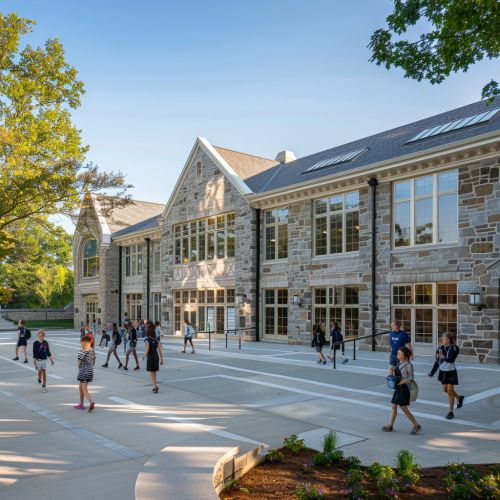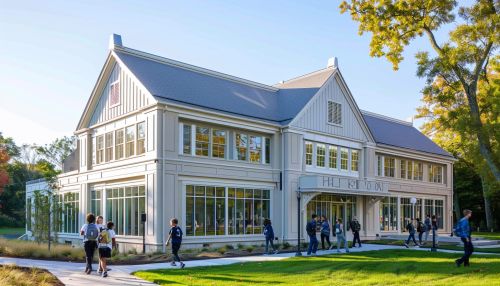College-preparatory school
Overview
A college-preparatory school, often referred to as a prep school, is a type of secondary school designed to prepare students for higher education. These institutions provide a rigorous academic curriculum that emphasizes the development of critical thinking, analytical skills, and a strong foundation in core subjects such as mathematics, science, literature, and the humanities. College-preparatory schools may be private or public, and they often offer advanced placement (AP) courses, International Baccalaureate (IB) programs, and other specialized academic tracks to challenge and engage students.
History
The concept of college-preparatory education has its roots in the early educational systems of Europe, particularly in the grammar schools of England, which aimed to prepare young men for university study. In the United States, the first college-preparatory schools emerged in the 18th century, with institutions such as Phillips Academy in Andover, Massachusetts, and Phillips Exeter Academy in Exeter, New Hampshire, setting the standard for rigorous academic training.
Curriculum
The curriculum at college-preparatory schools is designed to be challenging and comprehensive, with a focus on preparing students for the demands of college-level coursework. Key components of the curriculum typically include:
- **Core Subjects**: Emphasis is placed on core academic subjects such as mathematics, science, English, and social studies. These subjects form the foundation of a well-rounded education and are essential for success in higher education.
- **Advanced Placement (AP) Courses**: Many prep schools offer AP courses, which allow students to take college-level classes and earn college credit while still in high school. These courses are rigorous and require a high level of commitment and academic ability.
- **International Baccalaureate (IB) Program**: Some prep schools offer the IB program, which is an internationally recognized curriculum that emphasizes critical thinking, intercultural understanding, and a global perspective.
- **Electives and Extracurricular Activities**: In addition to core subjects, prep schools often offer a wide range of electives and extracurricular activities, including arts, music, sports, and clubs. These activities provide students with opportunities to explore their interests and develop new skills.
Admissions
Admission to college-preparatory schools is often competitive, with a selective application process that may include entrance exams, interviews, and a review of academic records and extracurricular achievements. Some schools also consider recommendations from teachers and other mentors. The goal of the admissions process is to identify students who are academically capable and motivated to succeed in a challenging educational environment.
Faculty and Staff
The faculty and staff at college-preparatory schools are typically highly qualified and experienced educators who are dedicated to providing a high-quality education. Teachers often hold advanced degrees in their subject areas and are committed to fostering a supportive and intellectually stimulating learning environment. In addition to classroom instruction, faculty members may also serve as advisors, mentors, and coaches, helping students to navigate the academic and social challenges of high school.
Facilities and Resources
College-preparatory schools often boast state-of-the-art facilities and resources designed to enhance the learning experience. These may include:
- **Science Laboratories**: Equipped with advanced technology and equipment, science labs provide students with hands-on learning opportunities in biology, chemistry, physics, and other scientific disciplines.
- **Libraries and Media Centers**: Well-stocked libraries and media centers offer a wealth of resources, including books, periodicals, digital media, and research databases, to support students' academic pursuits.
- **Athletic Facilities**: Many prep schools have extensive athletic facilities, including gymnasiums, sports fields, swimming pools, and fitness centers, to support physical education and extracurricular sports programs.
- **Arts and Performance Spaces**: Dedicated spaces for the arts, such as theaters, music rooms, and art studios, provide students with opportunities to explore their creative talents and participate in performances and exhibitions.
Student Life
Student life at college-preparatory schools is often vibrant and diverse, with a wide range of activities and opportunities for personal growth and development. Key aspects of student life may include:
- **Clubs and Organizations**: Students can join a variety of clubs and organizations, ranging from academic and professional societies to cultural and recreational groups. These activities provide opportunities for leadership, collaboration, and community engagement.
- **Community Service**: Many prep schools emphasize the importance of community service and encourage students to participate in volunteer activities and service projects. This fosters a sense of social responsibility and civic engagement.
- **Residential Life**: Some college-preparatory schools are boarding schools, where students live on campus during the school year. Residential life offers a unique opportunity for students to develop independence, build strong relationships with peers, and immerse themselves in the school community.
Outcomes and Achievements
Graduates of college-preparatory schools often achieve high levels of academic success and are well-prepared for the challenges of higher education. Key outcomes and achievements may include:
- **College Acceptance Rates**: Prep school graduates typically have high acceptance rates to prestigious colleges and universities, reflecting the strength of their academic preparation and the support provided by the school's college counseling programs.
- **Academic Honors and Awards**: Many students earn academic honors and awards, such as National Merit Scholarships, AP Scholar Awards, and recognition in national and international competitions.
- **Leadership and Career Success**: The skills and experiences gained at college-preparatory schools often translate into success in higher education and professional careers. Graduates frequently go on to become leaders in their fields and make significant contributions to society.
Challenges and Criticisms
While college-preparatory schools offer many benefits, they are not without challenges and criticisms. Some of the key issues include:
- **Cost and Accessibility**: Tuition and fees at private prep schools can be prohibitively expensive, making them inaccessible to many families. Although financial aid and scholarships are available, the cost remains a significant barrier for some students.
- **Pressure and Stress**: The rigorous academic environment at prep schools can lead to high levels of stress and pressure for students. Balancing demanding coursework with extracurricular activities and college applications can be challenging and may impact students' mental health and well-being.
- **Equity and Diversity**: Some critics argue that college-preparatory schools may contribute to educational inequality by providing advantages to students from more affluent backgrounds. Efforts to promote diversity and inclusion are ongoing, but disparities in access and resources remain a concern.
See Also
- Boarding School
- International Baccalaureate
- Advanced Placement
- Grammar School
- Phillips Academy
- Phillips Exeter Academy


